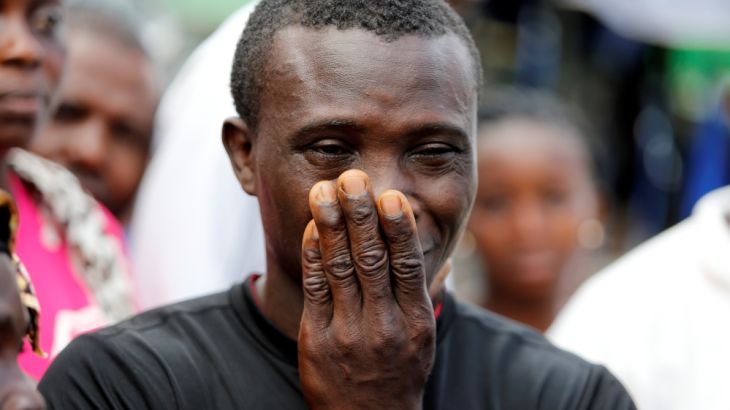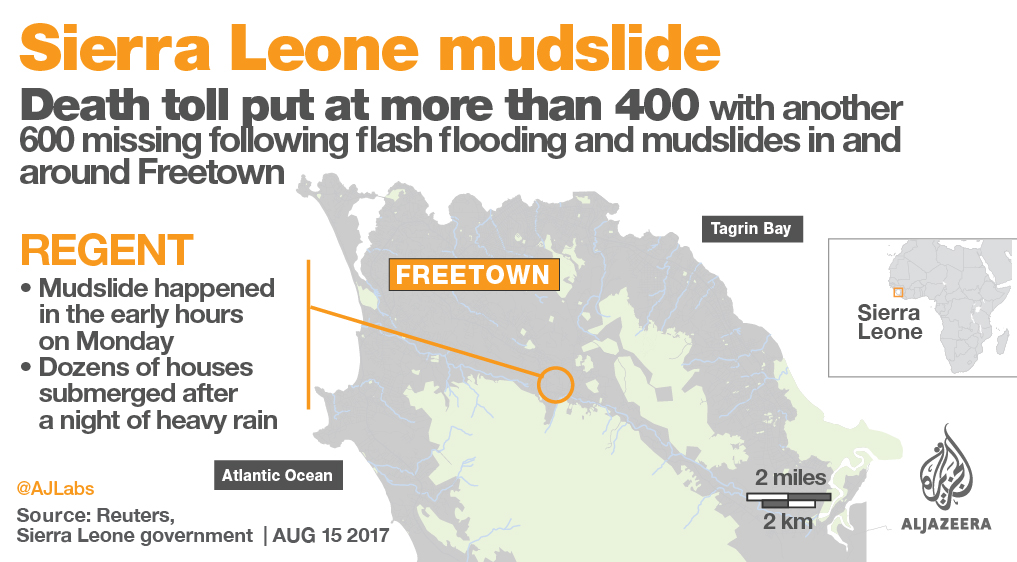Sierra Leone mudslide survivors describe shock, anger
First mass burial to take place on Thursday after floods and mudslides kill more than 400 people in Sierra Leone.

Three days after flooding and a mudslide that killed at least 400 people in Sierra Leone, survivors are full of shock and anger as they take on the daunting task of identifying and burying their loved ones.
Hundreds queued on Wednesday after the government summoned families to the morgue in the capital, Freetown, and said all unidentified bodies would be buried on Thursday and Friday amid fears of disease outbreaks from the corpses that have lain in the heat.
Keep reading
list of 4 items‘Mama we’re dying’: Only able to hear her kids in Gaza in their final days
Europe pledges to boost aid to Sudan on unwelcome war anniversary
Birth, death, escape: Three women’s struggle through Sudan’s war
The first mass burial is expected to begin at 3pm local time (15:00 GMT) on Thursday in the nearby town of Waterloo.
More than 100 of those who died are children as devastating mudslides struck before dawn on Monday after heavy rain.
On Wednesday, the Red Cross estimated that at least 600 others remained missing following the storm that struck as many of the victims were sleeping.
READ MORE – Sierra Leone mudslide: What, where and why?
“We were fast asleep when we heard the roaring sounds [of the mudslide] approaching,” 16-year-old Matu Katta told Al Jazeera.
“I went up the house to check. That was the last time I saw my family. The mud took everyone away except me and my aunt.”
Mattu is one of only two survivors of her family of 19.
![The government gave residents a deadline of Wednesday to identify their loved ones before mass burials were set to begin [Saidu Bah/Getty Images]](/wp-content/uploads/2017/08/e1611b59c1844428a3c1ff90ed652600_18.jpeg)
Another survivor, Hawa Stevens, spoke through tears as she talked about the 28 family members she lost in the mudslides.
“Mother, father, sisters, brothers, cousins all gone,” Stevens told The Associated Press.
“My life has been shattered … Please God, help.”
She later said she was only able to identify two members of her family.
IN PICTURES: Mass funerals for mudslide victims in Sierra Leone
Hawa Sillah described a similar scene, saying she and her sister were the only ones from her family to escape the floods.
“When the floods arrived, our house broke. The blocks fell on me. Fourteen of my relatives died, but I escaped with my sister,” she told The Associated Press.
“My husband and my child … I don’t know where they are. Even my sister, they said she is dead.”
![Thousands have lost their homes from the floods and mudslides [Afolabi Sotunde/Reuters]](/wp-content/uploads/2017/08/b57b29fcd3a44ae58f094fdd16d4e0f3_18.jpeg)
‘Time is running out fast’
Rescue workers continued on Thursday to dig out bodies from the mud and debris that came roaring down the hillsides onto the impoverished, low-lying areas of Freetown and the surrounding areas.
|
|
Al Jazeera’s Ahmed Idris, reporting from Matome, said heavy machinery had been brought in to remove rocks and bricks in hopes of recovering bodies.
“Time is running out fast,” he said.
“The work has been further complicated by the weather and shortage of manpower.”
The government has pleaded for international assistance as it reels from the disaster.
With rain forecast for at least the coming week, the threat of further mudslides around Freetown remained.
Many areas of the capital are near sea level and have poor drainage systems, which makes flooding worse during the rainy season.
‘No house, no food, no clothes’
Thousands, including Sayo Jalloh, lost their homes.
“I heard heavy rain all night, and at around 5:30am, I felt the ground shaking,” Jalloh, who lost 17 family members including her son, said.
“I told everyone to get out of the house, and we stood next to our neighbour’s house … within a second I saw these multi-storey houses coming down the hill.
“Even as I stand here now, I do not have a place to sleep. We have no food, no clothes, nothing at all. I have a large family at my hand, and my husband is getting old.”
![Many of the victims were sleeping when the mudslides struck before dawn on Monday [Saidu Bah/AFP]](/wp-content/uploads/2017/08/150e756ca99d4cdd8fd1cb127907ce1c_18.jpeg)
Adele Fox, national health coordinator for Sierra Leone at the charity Concern Worldwide, said the search for bodies continued, but the survivors were facing difficult conditions.
“There is basic need for food, water, sanitation equipment and medical assistance. Since it is still the rainy season, further flooding is also a possibility,” she said on Wednesday.
The prevailing sentiment among those in the disaster areas had shifted from shock and grief to anger at what is an annual problem in Freetown, she said, though never before on this scale.
Many have questioned why the government has not done more to tackle illegal construction in the overcrowded capital, which has been blamed for the scale of the destruction.
